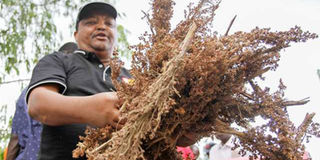Farmers now revel in sorghum supply plan

KBL has cut down on their production costs through provision of seeds, fertilisers and extension officers to monitor the crop development and maximize on their yields. FILE PHOTO | NMG
What you need to know:
- KBL has cut down on their production costs through provision of seeds, fertilisers and extension officers to monitor the crop development and maximize on their yields.
- The contractual farming has lured more women into sorghum farming in several parts of the country.
- A report by the report by the Tegemeo Institute of Agricultural Policy and Development of Egerton University says contractual farming has increased the number of women growing sorghum in Nakuru County, highlighting the growing popularity of the crop in the country.
Kaburu Anjuri is one of the thousands of farmers in Meru and Nyanza regions who have ditched the traditional crops for a share of the pie promised by Kenya Breweries for those who embrace sorghum.
Anjuri leads a group of close to a thousand growers from Meru that delivered 46,524 bags of the grain used to produce the lower end Senator Keg beer to the KBL plant in Nairobi making Sh87 million in returns.
He is among those who got a share of the Sh1.5 billion paid out to farmers this year.
“Since KBL started the project, many farmers have taken sorghum as a cash crop and stopped doing miraa, maize and ndengu,” Anjuri told Smart Company.
The soft-spoken farmer dumped maize and miraa farming in 2014 when he started growing sorghum.
Two years later, he landed a contract with KBL as an aggregator with at least a thousand farmers who just like him, gave up on other crops when they saw the change in fortunes that came with the brewer’s deal.
Anjuri says that unlike the frustrations faced by maize farmers in delayed payments from the government, KBL is timely. Farmers who deliver their harvests at the Kisumu plant and the main factory along Thika Road in Nairobi get Sh37 per kilogramme. KBL pays Sh32 per kilogramme in farm-gate prices.
The direct and guaranteed market has saved them from exploitation by middlemen who traditionally made a kill out of their meagre earnings through brokering the sale of sorghum and other cash crops.
KBL has cut down on their production costs through provision of seeds, fertilisers and extension officers to monitor the crop development and maximize on their yields.
The contractual farming has lured more women into sorghum farming in several parts of the country.
A report by the report by the Tegemeo Institute of Agricultural Policy and Development of Egerton University says contractual farming has increased the number of women growing sorghum in Nakuru County, highlighting the growing popularity of the crop in the country.




